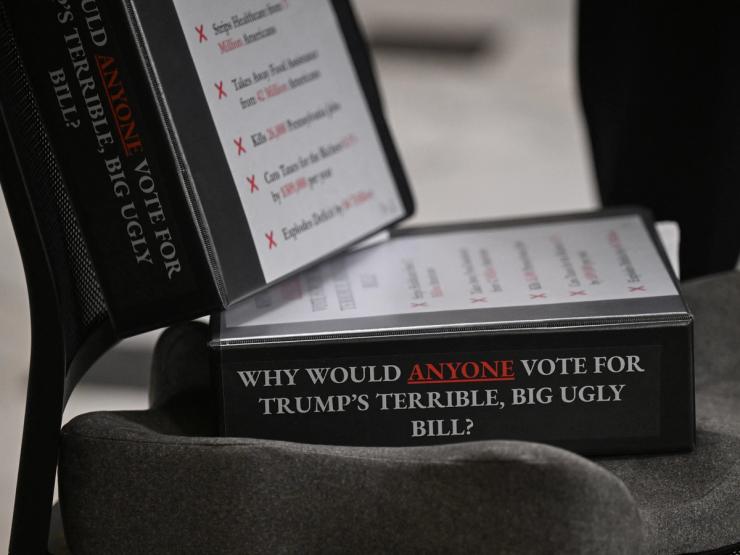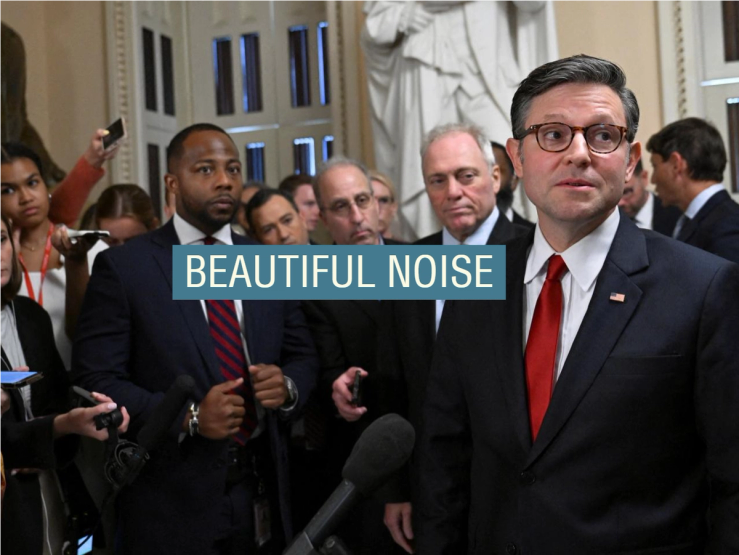The News
As Republicans scrounged for House votes to pass their far-reaching tax and spending bill on Wednesday, hours ahead of the presidentially-preferred July 4 deadline, they pointedly avoided getting into some details of what exactly they’d passed.
“Our Country will make a fortune this year, more than any of our competitors, but only if the Big, Beautiful Bill is PASSED,” President Donald Trump wrote on Truth Social.
Republicans found themselves promoting pieces of the bill that had already been taken out or watered down. They defended its reductions to Medicaid funding, on the basis that they might get reversed by a future Congress; they lauded its breaks for Social Security, even though they were relegated to simply offering a tax deduction to people who happen to also receive Social Security.
GOP leaders pushed into the night to get the votes needed for final passage, which could still come as soon as the late hours of Wednesday. In the meantime, Democrats who might have supported parts of the bill in a vacuum instead tried to sort fact from hyperbole, and were set on voting against all of it.
“The taxes for the wealthy and special interests are permanent, but the new tax cuts aren’t,” said Rep. Sarah McBride, D-Del. “It’s just ridiculous.”
Beneath the confusion is a familiar reality for Trump: His “big, beautiful bill,” which would extend a suite of 2017 tax cuts, add new ones, and cut health care spending to make up some of the difference, does not achieve some of what he ran on. That has not stopped him — or GOP lawmakers — from saying it does.
Know More
One promise, of “no taxes on Social Security,” had been bent into a four-figure tax deduction — $4,000 in the House’s version of the bill, $6,000 in the Senate version that may replace it.
But a fact sheet shared by House Speaker Mike Johnson on Wednesday repeated the claim the bill simply ended Social Security taxes outright.
Another Trump promise, to not cut Medicaid, morphed into work requirements designed to remove people from the program, on the assumption that they might find jobs and get insurance coverage that way. Republicans like Missouri Sen. Josh Hawley, who had inveighed against Medicaid cuts, dropped their opposition.
To sell the bill, Republicans separated Medicaid recipients into two camps, as delineated by House Majority Leader Steve Scalise.
Republicans distinguished between the “truly disabled and needy,” whom they argue the 60-year-old program was designed to help, and those who should be paying or working for their health care. That second group includes noncitizens covered by state health care programs, as well as people in states that had adopted the Affordable Care Act’s Medicaid expansion.
But the Senate-passed version of the bill did not actually cut off Medicaid for noncitizens — another source of confusion. A memo from the House Freedom Caucus that urged party leaders to add back “protection against illegals getting Medicaid,” linked to a study of noncitizens receiving nutrition assistance, not Medicaid.
And a House proposal to create savings funds for children — first named MAGA accounts, now named TRUMP accounts — lost a requirement that the parents have a Social Security number on the way to Senate passage, theoretically allowing undocumented parents to take advantage.
“I don’t like that,” South Carolina Rep. Ralph Norman, one of the House Freedom Caucus members who wanted more changes in the bill, told Semafor of that change. “Illegals shouldn’t get a paycheck.”
Several of the changes that House Republicans obscured — and lamented, at turns — on Wednesday came thanks to the Senate’s nonpartisan parliamentarian, a referee who has similarly trimmed Democratic ambitions in the past.
Yet that didn’t help party leaders’ case as they kept pushing into Wednesday night.
The View From Republicans
As in 2017 and 2021, the party with full control of government in Washington was using the budget process to pack as much as it could into a package that only needed 51 votes to get through the Senate.
Like the 2017 Tax Cuts and Jobs Act, and the 2021 American Rescue Plan, it would transform the country with a mix of cuts, benefits, and incentives — and by undoing the opposition party’s most recent work.
Republican resistance to final passage on Wednesday was largely about whether the bill would do enough to undo former President Joe Biden’s legacy.
“They jammed in the provision that guts the Green New Scam reforms that we put in place,” Texas Rep. Chip Roy told Steve Bannon, bemoaning that the final bill might not wipe out the Biden-era clean energy projects and tax credits that Republicans had overwhelmingly opposed.
Led by the president, Republicans advertised the parts of the bills that polled the best — tax cuts, including an end to a tax on tips that began as a bipartisan effort to shore up Social Security in the 1980s.
The bill could achieve a decade-long goal of rolling back the Affordable Care Act, but the president preferred to talk about it as a zero-cost reform.
“We’re cutting $1.7 trillion in this bill, and you’re not going to feel any of it,” he said at the White House last week.
The View From Democrats
No congressional Democrat was considering a vote for the bill; House Democratic Leader Hakeem Jeffries said at a Wednesday rally that his party would vote “hell no.”
Outside of Washington, Democrats were pre-emptively warning that any benefit cuts voters might face would be Trump and Republicans’ fault, not theirs.
“Hundreds of thousands of people are going to lose their health care if this gets signed into law,” Illinois Gov. JB Pritzker said on Tuesday. “The state of Illinois can’t cover the cost. No state, in the country, can cover the cost.”

Democrats, frequently distracted by fights inside the party or by other Trump decisions, had spent weeks trying to bring the national conversation back to Medicaid.
That effort even included Zohran Mamdani, the Democratic mayoral nominee in New York City, who responded to Trump’s musing about whether he could deport him by accusing him of trying to distract from the GOP bill.
“I fight for the same people that he said he was fighting for,” Mamdani told reporters.
David’s view
The Trump administration started with a multipart premise that was always going to be impossible to meet: The 2017 tax cuts could be made permanent. New tax cuts could be delivered for blue-collar workers. And this could be paid for by repealing the “Green New Scam” and getting rid of government waste.
“How much do you think we can rip out of this wasted, $6.5 trillion Harris-Biden budget?” future Commerce Secretary Howard Lutnick asked Elon Musk at Trump’s pre-election Madison Square Garden rally.
“Well, I think we can do at least $2 trillion,” said Musk.
By DOGE’s own estimate, it fell 90% short of that goal, finding $190 billion in spending cuts — a number that’s been frequently disputed.
An updated argument, which you could hear on the House floor this week, was that extending the 2017 tax cuts prevented a budget-busting recession. Tax cuts are free; health care is expensive, and anyone who might lose their health care coverage could be taken care of by the private sector.
This has been a hard sell, even in a media environment where the president’s critics on the right struggle to break through. Pro-Trump groups have found that voters support new tax cuts; other pollsters have found a lot of agreement with Democrats’ criticism that Republicans are cutting benefits to pay for tax cuts for the rich.
And the rapid process of moving this bill has led to confusion about what’s actually in it.
Whatever passes — if it passes — will achieve generational Republican goals, lowering taxes (most for wealthier Americans) and curtailing the post-Obama welfare state.
But the Trump campaign had previously suggested that it could cut taxes without curtailing much of anything, besides tax credits for solar panels and Medicaid fraud. Before he quit the administration, Musk suggested that Americans might get a $5,000 DOGE dividend check from all the savings — an idea that still circulates in GOP fundraising emails.
How popular is the reality of all this? I was struck at a Tuesday night rally for Virginia’s GOP statewide ticket helmed by Gov. Glenn Youngkin that there was no mention of the mega-bill moving through Congress, 15 miles away.
Just two months earlier, Youngkin joined most Republican governors on a letter that urged passage of whatever ended up being in the “big, beautiful bill.”
Notable
- In the New York Times, Jacob S. Hacker and Patrick Sullivan make the liberal case against the bill: “Americans have yet to fully understand the special alchemy of inegalitarianism that defines it.”
- In Quartz, Joseph Zeballos-Roig digs into the “TRUMP Accounts” change.
- In The Wall Street Journal, the editorial board argues that the “meh” bill “has to pass,” despite some issues. “The bill is more than anything the triumph of GOP political necessity, and the end of tax uncertainty is its main virtue.”
- For the progressive watchdog group Media Matters, Matt Gertz writes that since Trump took office again, Fox News mentioned “Medicaid” only one-tenth as frequently as it mentioned Joe Biden. “While Fox personalities have at times defended or downplayed the bill’s proposed Medicaid cuts, our data shows that the network is largely trying to avoid discussing them altogether.”


